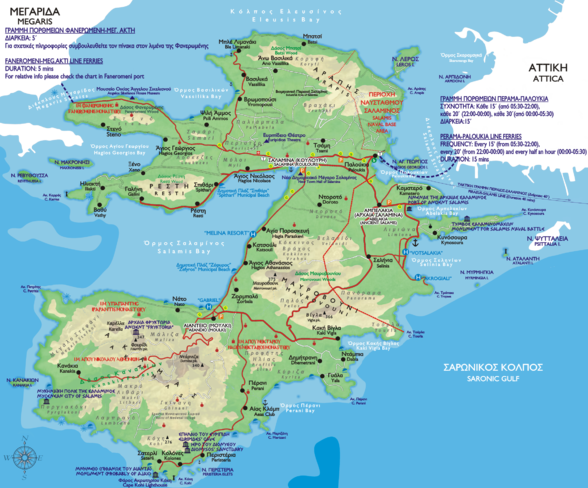
The naval battle at the Straits of Salamis on 22 September 480 BC between the allies of the Greek States and the Persian Empire has gone down in history as one of the most important sea battles. It marked the end of the second Persian invasion of Greece. It also showed how one man, Themistocles, could devise a clever plan and use whatever means were needed to carry it out.
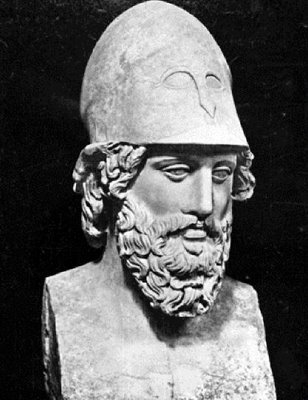
Themistocles, one of the Athenian archons and generals, believed that Piraeus, Athens’ port, should be enlarged and a walled passage be built linking Athens with Piraeus. He used the revenue from the silver mines of Lavrion to expand the Athenian fleet from 70 to 200 ships and so be ready for a new Persian invasion. The first Persian invasion was in 490 BC under Darius, where Darius was defeated at the battle of Marathon. Darius’ successor, Xerxes, led an even bigger army in 480 BC. He was successful in defeating the Greeks at the narrow passage of Thermopylae where Leonidas and his Spartans were killed due to the treachery of Ephialtes. Xerxes also won the naval battle at Artemisio, off the coast of Euboea, where half of the Greek fleet was destroyed. Xerxes army was now advancing towards Athens. It was therefore imperative for the Greeks to make a stand that would defeat the Persian armies once and for all so that they would not advance into the Peloponnese. He ordered the people to abandon Athens so that they could be saved from the oncoming Persian army. Some crossed over to Aegina and others went to the island of Salamis.
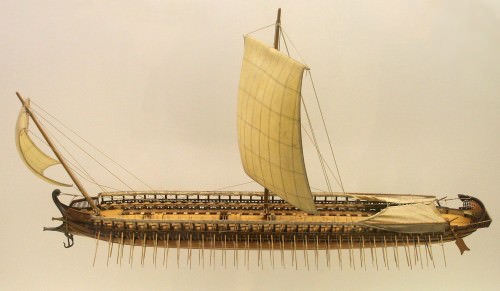 The Greeks wanted to make a stand at the Corinthian Isthmus, but Themistocles was able to persuade them to face the Persians in the narrow Straits of Salamis using the triremes, and not fighting on land. In this he was helped by the oracle of Apollo at sacred Delphi, when he interpreted the typically obscure proclamation by the oracle that ‘only a wooden wall will keep you safe’ as meaning not fortification walls around Athens, but wooden ships. Themistocles believed that Athenian naval supremacy was the best defence against invasion.
The Greeks wanted to make a stand at the Corinthian Isthmus, but Themistocles was able to persuade them to face the Persians in the narrow Straits of Salamis using the triremes, and not fighting on land. In this he was helped by the oracle of Apollo at sacred Delphi, when he interpreted the typically obscure proclamation by the oracle that ‘only a wooden wall will keep you safe’ as meaning not fortification walls around Athens, but wooden ships. Themistocles believed that Athenian naval supremacy was the best defence against invasion.
The Greek fleet included ships from other city-states especially Corinth and Aegina making up a total of 300 ships to the Persian fleet of 500. The Greeks had the advantage as they knew the waters of the Salamis Strait much better. Also, the Persian ships were heavier and more cumbersome than the smaller Greek triremes. The Greeks were victorious because they were fighting for their lives and for the things they believed in.
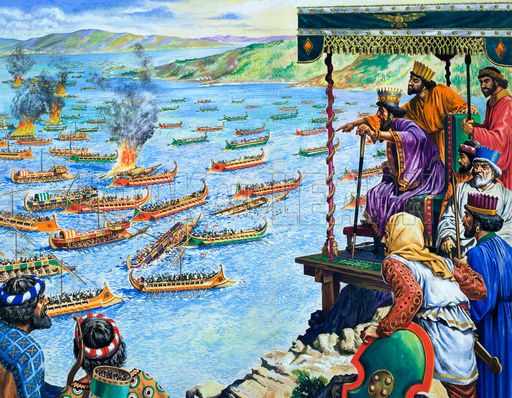 Xerxes was forced to return to Susa (Greek: Σούσα), the capital city of Persian, leaving the greatest part of the army under the command of Mardonius to make a final stand at Plataea in 479 BC. The Greek forces were commanded by Xanthippus and Aristeidis, who had been recalled from exile. The decisive battle at Plataea finally ended Persian’s ambition to conquer Greece. Athens was rebuilt and the period of art and culture began which would become known as the Golden Age of ancient Greece forming the foundations of Western culture.
Xerxes was forced to return to Susa (Greek: Σούσα), the capital city of Persian, leaving the greatest part of the army under the command of Mardonius to make a final stand at Plataea in 479 BC. The Greek forces were commanded by Xanthippus and Aristeidis, who had been recalled from exile. The decisive battle at Plataea finally ended Persian’s ambition to conquer Greece. Athens was rebuilt and the period of art and culture began which would become known as the Golden Age of ancient Greece forming the foundations of Western culture.
Xerxes watching the destruction of his fleet
from the hilltop opposite Salamis.
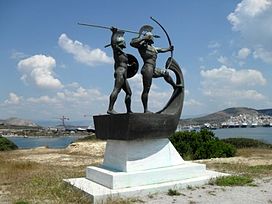
If the Persians had won at Salamis, the development and advancement of ancient Greece would have stopped and as a result Western civilisation would not be what it is today.
Monument for the Battle of Salamis, Kynosoura
Peninsula by sculptor Achilles Vasileiou
Aeschylus states that the Persians, when they were approaching the Straits of Salamis and before seeing the Greek fleet, heard the Greeks singing the following war song.
Εμπρός, γιοί των Έλλήνων, Forward, o sons of the Greeks,
Ελευθερώστε την πατρίδα, Liberate your country,
Ελευθερώστε τα παιδιά σας, τις Liberate your children,
Γυναίκες σας, your women,
Τους βωμούς των Θεών των πατέρων σας, The seats of your farther’s gods,
Και τους τάφους των προγόνων σας: And the tombs of your forebears:
Τώρα είναι ο αγώνας για τα πάντα. Now is the struggle for all things.
The battle of Salamis was made into a film: 300: Rise of an Empire in 2014. It is based on the Battle of Artemisium and the Battle of Salamis. The film starred Sullivan Stapleton as Themistocles and Eva Green as Artemisia.
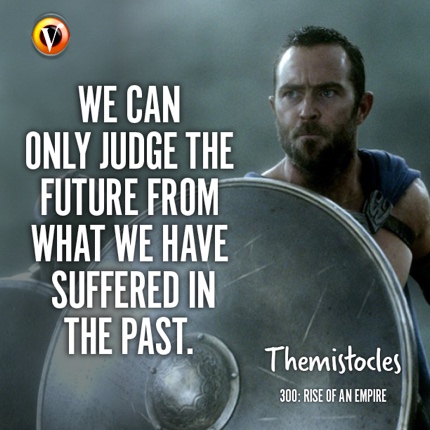
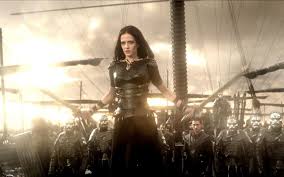
Celebrations for this milestone in the history of Greece take place on this day every year on Salamis.
Despena Dalmaris